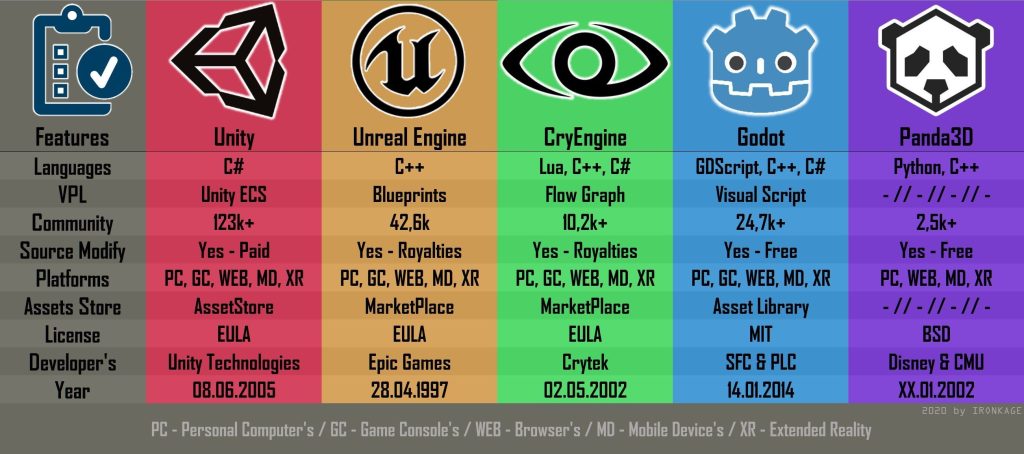
In the world of gaming, a game engine is the heart and soul of any video game. Over the years, we have witnessed remarkable advancements in game engine technology, enabling developers to push the boundaries of what is possible. Two of the most renowned and widely used game engines in the industry are Unity and Unreal Engine. Today, we will take an in-depth look at their evolution and see how they have transformed the gaming landscape.
I. The Genesis of Unity and Unreal Engine:
1.1 Unity:
Unity, developed by Unity Technologies, made its debut in 2005. Originally designed for the Mac OS X platform, it quickly gained popularity due to its simplicity and versatility. Unity allowed developers to create games that could be deployed across multiple platforms effortlessly.
1.2 Unreal Engine:
Unreal Engine, on the other hand, was introduced by Epic Games in 1998. Initially built for first-person shooter games, it eventually evolved into a comprehensive game development tool. Unreal Engine stood out due to its powerful graphics capabilities, offering developers the opportunity to create visually stunning and immersive experiences.
II. Features and Capabilities:
2.1 Unity:
Unity established itself as a go-to game engine by providing an intuitive Integrated Development Environment (IDE) and a vast asset store. Its drag-and-drop functionality, along with a powerful scripting language called C#, allowed developers to quickly bring their visions to life. Unity’s cross-platform compatibility made it a popular choice for independent developers and small studios.
2.2 Unreal Engine:
Unreal Engine, on the other hand, offered a robust set of features, making it an industry favorite for AAA game development. With advanced rendering capabilities, real-time visual effects, and a powerful Blueprint visual scripting system, Unreal Engine empowered developers to achieve stunning graphics and intricate gameplay mechanics. Additionally, Unreal Engine’s networking capabilities made it an ideal choice for multiplayer and online games.
III. Evolution and Industry Adoption:
3.1 Unity:
Unity steadily evolved, and with each iteration, it added new features and enhancements to its arsenal. It expanded beyond its 2D origins to fully support 3D game development. Unity also implemented features like real-time global illumination, particle systems, and advanced physics simulations, solidifying its position as a versatile game engine.
3.2 Unreal Engine:
Unreal Engine has always been at the forefront of cutting-edge technology. It continuously pushed the boundaries of what was possible, with updates introducing features like dynamic lighting, advanced physics simulations, and cinematic tools. Unreal Engine’s adoption by major studios for blockbuster titles showcased its prowess and cemented its position as a leading game engine in the industry.
IV. Community and Ecosystem:
4.1 Unity:
Unity thrived on its robust community, which contributed to a vibrant ecosystem. The Unity Asset Store became a treasure trove of assets, plugins, and scripts, empowering developers to quickly enhance their projects. The community-driven support further accelerated Unity’s growth, as developers could access a wealth of knowledge through forums, tutorials, and user-contributed resources.
4.2 Unreal Engine:
Unreal Engine also fostered a dedicated community, supported by Epic Games itself. The Marketplace offered developers a centralized hub for assets, plugins, and ready-made content. In addition, Epic Games actively engaged with its community, organizing events, providing tutorials, and granting developers access to the engine’s source code. This open communication contributed to the rapid growth and adoption of Unreal Engine.
V. The Future of Game Engines:
Both Unity and Unreal Engine continue to evolve, introducing groundbreaking features and optimizations with each iteration. Unity’s focus on accessibility and cross-platform compatibility makes it a viable choice for indie developers and smaller projects. On the other hand, Unreal Engine shines in graphical fidelity, realistic physics simulations, and has established itself as the engine of choice for many AAA studios.
Conclusion:
The evolution of game engines like Unity and Unreal Engine has revolutionized the gaming industry, enabling developers to create immersive and visually stunning experiences. Both engines have contributed significantly to the growth of the industry, each with its own set of capabilities and advantages. Whether you choose Unity for its versatility or Unreal Engine for its graphical prowess, one thing is certain – these engines have played a monumental role in shaping the future of gaming.


